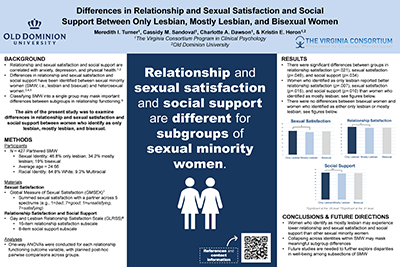College
College of Sciences
Department
Psychology
Graduate Level
Doctoral
Graduate Program/Concentration
Clinical Psychology
Publication Date
2023
DOI
10.25883/xz5c-tr31
Abstract
The most at-risk population among women for HIV diagnosis in the U.S. are Black women, who account for 61% of all new HIV cases. Pre-exposure prophylaxis (PrEP) is a safe and effective HIV prevention method for people at risk of HIV acquisition. Despite being disproportionately affected by HIV, Black women’s knowledge, perceived benefits, and uptake of PrEP remain low. The socio-ecological model may be useful for understanding why there is a low uptake of PrEP among Black women by examining the complex interplay between individual, relationship, community, and societal factors. The current study used the socio-ecological framework to explore provider perspectives on the barriers and facilitators of PrEP uptake among Black women in Eastern Virginia. Semi-structured interviews were conducted with a purposeful sample of one PrEP prescriber and 14 community healthcare workers. Healthcare providers identified barriers to PrEP uptake among Black women at the individual (e.g., basic needs not met, lack of childcare, low medical literacy), interpersonal (e.g., perception partner(s) are safe), community (e.g., long waitlists, military culture lacks anonymity), organizational (e.g., clinic materials focus on men), and societal (e.g., PrEP ads focus on gay men, stigma, lack of trust in the medical community) levels. Providers also identified factors that facilitate PrEP uptake at the individual (e.g., flexible work schedule, current/past STI diagnosis), interpersonal (e.g., partner is HIV positive), organizational (e.g., more female screeners/providers, PrEP materials that include women, encouraging PrEP for everyone), community (e.g., making PrEP information available where Black women go), and societal (e.g., HIV education in schools) levels. These findings highlight unique barriers to accessing and taking PrEP for Black women in the U.S., and potential factors that could facilitate PrEP use. Examining barriers and facilitators may be important to guide future research that considers multi-level interventions to improve uptake of PrEP among Black women.
Keywords
Black women, HIV, Pre-exposure prophylaxis (PrEP)
Disciplines
Community Health | Health Psychology | Women's Health
Files
Download Full Text (641 KB)
Recommended Citation
Pitchford, Kayla; Shangani, Sylvia; Dawson, Charlotte; and Heron, Kristin, "Community Healthcare Providers’ Perspectives on HIV Pre-Exposure Prophylaxis (PrEP) Use among Black Women" (2023). College of Sciences Posters. 19.
https://digitalcommons.odu.edu/gradposters2023_sciences/19



